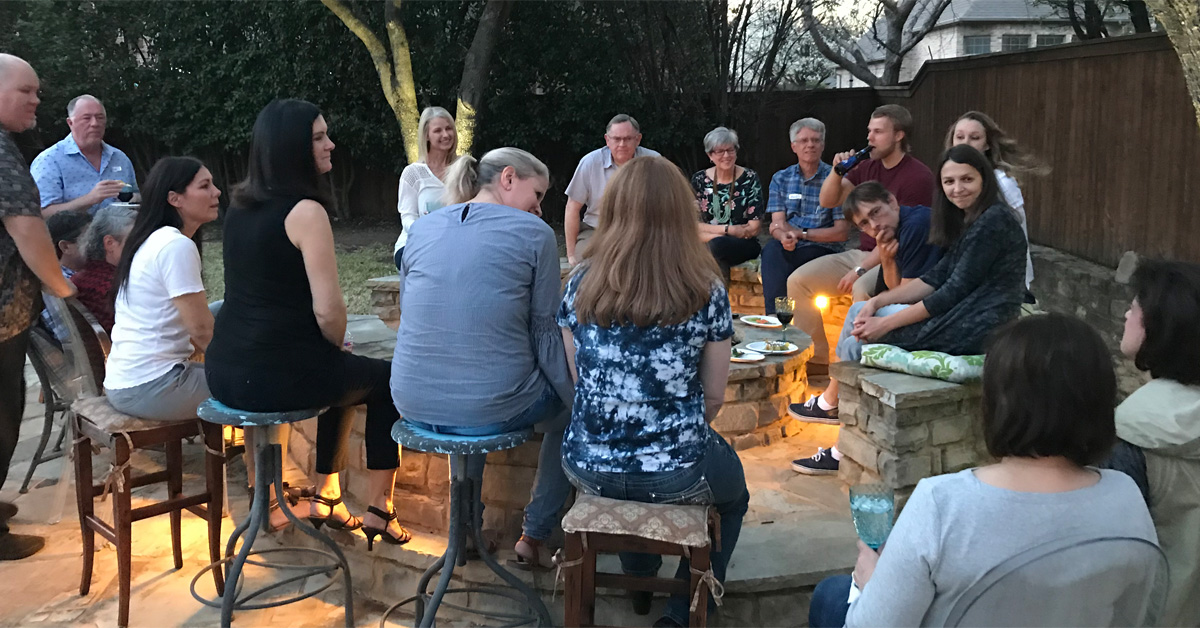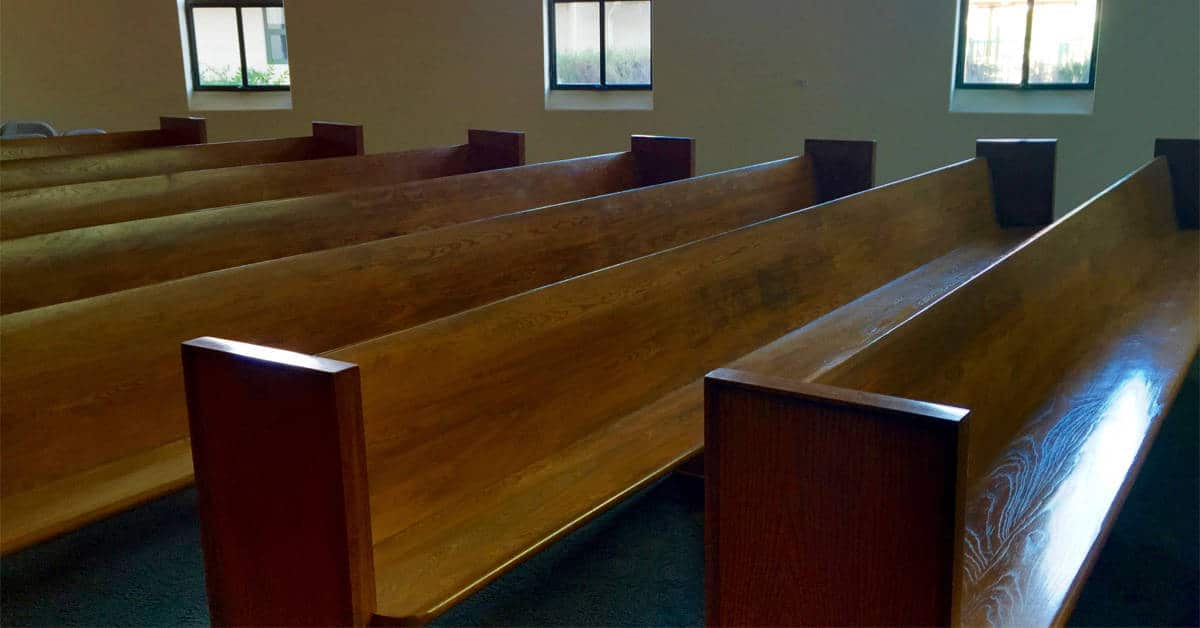By Wayne Jacobsen
I’m growing convinced that much of Christianity has become a human religion loosely based on the teachings of Jesus, while missing the point of them all.
Every week now I get links to blogs and articles of various pastors giving the 5, 8, or 12 reasons everyone needs to attend a local church each week. To prove their point, however, they have to make some of the most ridiculous statements that have absolutely no grounding in the life or character of Jesus. These conclusions are not just misguided, but actually destructive to people who want to grow in his life and joy.
This is not a personal judgment against them. I’m sure many of them are fine people, only trying to do what they feel called to. I also appreciate that this is a scary time for them as so-called church attendance is on the decline. The idea that someone can actually grow in their relationship with God, experience the life of the church, and share his mission in the world without being part of their congregation has to be a scary reality. Many don’t even want to acknowledge it is even possible, so they double down on the language of obligation and accountability. In doing so, however, they twist the Gospel so that it is no longer recognizable and all that’s left is for people to obey what they are told by leadership whose success and livelihood depend on that obedience.
There are many good reasons to gather regularly with other believers and share the journey of faith. It’s just that all those gatherings are not going on in Sunday morning services shackled by the bureaucracy of a religious system that often does more stifle spiritual growth rather than stimulate it. Many have found more engaging ways to share the life of the church beyond the walls of traditional congregations and telling them they must attend a normal service, falls on deaf ears once they’ve discovered that it isn’t true.
So if they hope guilt and obligation will win these people back or scare the ones they have into remaining, they are not only fighting a losing battle but disfiguring God and distorting the Gospel to do it. The life of the church is not found in obligation but in the joy of affection and transformation. Trying to discount the salvation of those who leave in hopes of reigning back in the faithful will continue backfire.
In the latest article I read Nathan Rose, a Missouri pastor in the Southern Baptist denomination says that skipping “church” meetings is dangerous to your health. He gives five reasons why in a recent article he wrote, Five Spiritual Dangers of Skipping Church:
- “You will miss out on God’s primary design for your spiritual growth and well-being.” What in the ministry of Jesus leads him to the conclusion that God’s primary means to grow to spiritual maturity is to attend a church service weekly, when he never conducted one himself, never taught his disciples how to do so, and assigned the task for our growth to the Holy Spirit who would dwell in us and guide us to all truth? When the Samaritan woman asked Jesus where she should worship, he made it clear that location is not the issue. What matters is that we do so in spirit and in truth. Living in the Father’s affection and responding to his Spirit within us is God’s primary design for our growth and well-being, not sitting in a pew on Sunday morning.
- “You disobey God.” As many do, Rose pulls out Hebrews 10:24-25 saying that the counsel “not to neglect to meet together,” is a command that can only be fulfilled in a weekly church service. It’s dishonest on the face of it. This is the only Scripture pastors have to seek to compel “church attendance” and it is misused at that. This passage wasn’t written to believers skipping out on church services, but to people under persecution who were wondering if avoiding association with each other would make it more difficult for the authorities to find them. The writer is telling them they have more to gain by the encouragement they have from each other than going it alone. Most Sunday services don’t even allow people to encourage each other, since the focus is on the platform. Hebrews 20 is not talking about attending a meeting; it is about staying connected to others and not trying to make it alone. Honestly many of our institutions today do more to inhibit that connection than encourage it.
- “You make a statement to the world that God is not worthy of worship…, which is the attitude and conduct of unbelievers, not God’s people.” So if you don’t come to “worship” you are no longer one of God’s people. The judgment here is frightful. Worship is not a song service or a sermon, but a live lived in God’s reality and his affection. How we see him and how we love and respect others either brings glory to him or disfigures him. Sitting in a pew on Sunday morning is not a statement of how important worship is to you unless that’s the only way you understand worship and then you are spiritually impoverished the rest of the week. Our lives worship him whether we’re on the job, enjoying his creation, or serving someone in need.
- “You can’t minister to anyone.” Really? All the ministry that God wants to do in the world can only happen under a steeple on Sunday morning? That would be laughable if it weren’t so tragic. Jesus never ministered in a “service,” but on the street where he encountered people. Real service is not sitting in a pew so others can hear you sing and you can show support for the pastor. Ministry is about loving and helping people you know or come across as you go through life. They can be in your neighborhood, at work, in school, or across the world.
- “You skip out on a foretaste of heaven.” If Sunday morning services were really a foretaste of heaven, no one would want to miss them and you wouldn’t have to obligate them to be there. In many cases it’s just a repeated formula often laced with guilt and condemnation, as was the entire piece written by Rose.
What bothers me most is not that they want people to come to “their church”, but that they see obligation as the reason. They make the same mistake the Galatians made. By turning the promise of God into an obligation they distort the gospel, twisting the joy of an invitation into God’s life into demands and threats. It has the underlying psychology of “misery loves company.” We are not here because we enjoy it and God works in us, but because God says we have to. Please! The kingdom is the pearl of great price, not the castor oil of spiritual maturity.
Paul, the apostle, encourage us to live in freedom and let “no one” defraud us by telling us where we should go, what we should eat, or what we should wear. People who try to tell you what you should do, rather than equipping you to live fully and freely in Jesus, have lost connection with the Head.
I honestly feel sorry for those who can’t see the reality of Christ’s church beyond their own congregation or the congregational model itself. They would perhaps do better to take an honest look why people who were committed members of their congregation found it necessary to leave. Badgering them with accusations and demands will never fulfill the work of the kingdom. Maybe it is time for them to ask just how much their gatherings reflect God’s nature and reality. Those congregations who honestly seek to help people live in the reality of Jesus’ freedom and transformation need not be threatened that Jesus is also working outside their borders.
In fact if they put his kingdom first, they will rejoice that he does.
__________________________
Wayne Jacobsen is the author of Finding Church and host of a podcast at TheGodJourney.com.









I find it scary when you make a comment, post or text with someone and then a couple of days later you find someone else saying the same exact thing with a little more perspective, detail or clarity. Of course that it is not scary like I’m afraid, let’s run away. It’s more like scary haha, wow, are you kidding me, that is incredibel, we have a Father that works like that? Love the post. I’ve got to share it and “scare” some friends.
I find it scary when you make a comment, post or text with someone and then a couple of days later you find someone else saying the same exact thing with a little more perspective, detail or clarity. Of course that it is not scary like I’m afraid, let’s run away. It’s more like scary haha, wow, are you kidding me, that is incredibel, we have a Father that works like that? Love the post. I’ve got to share it and “scare” some friends.
Religion can be dangerous to your health. I was one of the many women who ended up in a home for unwed mothers and coerced into giving up the baby for adoption. Someday I, like many others have already now, will write my story. It started a downward spiral in my life, and I didn’t even realize it was really the cause, because I was supposed to experience basically go away for several months and come back and just get on with it, as if nothing had happened, but I saved my devout Catholic family from shame.
Recently I discovered and watched one of the movies and various documentaries about the Magdalene Launderies. But for the grace of God, as bad and traumatic as my situation was, it could have been much, much worse. And that abuse kept going on until 1996 and, who knows, it may be going in in a third-world country somewhere now. With the Catholic Church you never know.
Then I watched some of the documentaries I had avoided for so many years on the abuse scandals, because I was back in the church since 2007, and I think I really wanted to believe it was a few “bad apples.” I wasn’t shocked, but I felt intense pain watching these documentaries. We’re not talking about a few lives here. Catholics often like to make statements about percentages — oh, it’s only 5%, and it happens all over. Maybe, maybe not, but what I saw was thousands and thousands of victims through generations. It answered a question I had when I was going to Al-Anon — why is it that in all the groups I attended the vast, vast majority was Catholic, why so many Catholics of Irish descent?
A man named Bill Donohue, a very well-paid head of The Catholic League is busy writing denial and/or minimization pieces — long pieces — on these two situations. In the Catholic Church it’s not the individual parishes so much, but it all stems from the top. The atrocities started at the beginning and never stopped.
I don’t know about other Christian religions, although I have read the experiences of those who have left, many extremely painful. In a Catholic parish at least you can attend and leave and nobody cares — nobody cares — unless you were deeply involved, giving of your time and especially your money. I’ve written comments about leaving the Catholic Church and talking about leaving behind the guilt, shame and all the rest on YouTube and I was attacked visciously by other Catholics, called a liar, that my experiences did not happen, that I would burn in hell and that I should come back. The first time I was so shaken that, thanks to the power of YouTube, I deleted the conversation so I didn’t have to see it again.
But, with a “warm and fuzzy” invitation like that how could I possibly resist going back to the Catholic Church? It simply helped me to realize that my decision was the right one — I would never go back. I separated God from religion. God’s Word is my treasure.
These are only some of the people and books that have helped me: Emmett Fox and Joseph Murphy, their work led me to the Bible, and understanding and falling in love with God’s Word, reading “The Shack” gave me a further longing for God, Wayne Jacobson’s “So You Don’t Want to Go to Church Anymore.” A book that recently impacted me greatly was “The Autobiography of George Muller,” a man who did what he did to prove the reality of the Living God. The list of teachers I’ve had on my journey is so varied. I stay away from any sities or so-called ministries that scream out the word “heretic” or try to instill condemnation and fear into people, while calling themselves pure. I take what is Truth and I leave the rest.
Religion can be dangerous to your health. I was one of the many women who ended up in a home for unwed mothers and coerced into giving up the baby for adoption. Someday I, like many others have already now, will write my story. It started a downward spiral in my life, and I didn’t even realize it was really the cause, because I was supposed to experience basically go away for several months and come back and just get on with it, as if nothing had happened, but I saved my devout Catholic family from shame.
Recently I discovered and watched one of the movies and various documentaries about the Magdalene Launderies. But for the grace of God, as bad and traumatic as my situation was, it could have been much, much worse. And that abuse kept going on until 1996 and, who knows, it may be going in in a third-world country somewhere now. With the Catholic Church you never know.
Then I watched some of the documentaries I had avoided for so many years on the abuse scandals, because I was back in the church since 2007, and I think I really wanted to believe it was a few “bad apples.” I wasn’t shocked, but I felt intense pain watching these documentaries. We’re not talking about a few lives here. Catholics often like to make statements about percentages — oh, it’s only 5%, and it happens all over. Maybe, maybe not, but what I saw was thousands and thousands of victims through generations. It answered a question I had when I was going to Al-Anon — why is it that in all the groups I attended the vast, vast majority was Catholic, why so many Catholics of Irish descent?
A man named Bill Donohue, a very well-paid head of The Catholic League is busy writing denial and/or minimization pieces — long pieces — on these two situations. In the Catholic Church it’s not the individual parishes so much, but it all stems from the top. The atrocities started at the beginning and never stopped.
I don’t know about other Christian religions, although I have read the experiences of those who have left, many extremely painful. In a Catholic parish at least you can attend and leave and nobody cares — nobody cares — unless you were deeply involved, giving of your time and especially your money. I’ve written comments about leaving the Catholic Church and talking about leaving behind the guilt, shame and all the rest on YouTube and I was attacked visciously by other Catholics, called a liar, that my experiences did not happen, that I would burn in hell and that I should come back. The first time I was so shaken that, thanks to the power of YouTube, I deleted the conversation so I didn’t have to see it again.
But, with a “warm and fuzzy” invitation like that how could I possibly resist going back to the Catholic Church? It simply helped me to realize that my decision was the right one — I would never go back. I separated God from religion. God’s Word is my treasure.
These are only some of the people and books that have helped me: Emmett Fox and Joseph Murphy, their work led me to the Bible, and understanding and falling in love with God’s Word, reading “The Shack” gave me a further longing for God, Wayne Jacobson’s “So You Don’t Want to Go to Church Anymore.” A book that recently impacted me greatly was “The Autobiography of George Muller,” a man who did what he did to prove the reality of the Living God. The list of teachers I’ve had on my journey is so varied. I stay away from any sities or so-called ministries that scream out the word “heretic” or try to instill condemnation and fear into people, while calling themselves pure. I take what is Truth and I leave the rest.